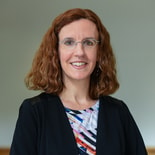Reframing Dysphagia Documentation With a Person-Centered Approach
Presented by Karen Sheffler and Yvette McCoy
12-Month Subscription
Unlimited access to:
- Thousands of CE Courses
- Patient Education
- Home Exercise Program
- And more
Nonfinancial: Karen Sheffler has no competing nonfinancial interests or relationships with regard to the content presented in this course. She is a member of the ASHA Special Interest Group 13, the National Foundation of Swallowing Disorders (NFOSD), and the Dysphagia Research Society. She was a member of the Website, Communications, and Public Relations Committee (WCPRC) from May 2017–April 2020. She has been a member of the American Board of Swallowing and Swallowing Disorders’ (ABSSD) Public Relations and Communications Committee (PRCC) since 2018 and cochair since 2020, a member of two work groups of the United States and Territories IDDSI Reference Group, and IDDSI champion since 2014.
Financial: Yvette McCoy receives compensation from MedBridge for this course. She is the owner of Speak Well Solutions, LLC. She receives a full-time salary from Moravian University and receives honoraria for online webinars.
Nonfinancial: Yvette McCoy has no competing nonfinancial interests or relationships with regard to the content presented in this course. She is the secretary of the American Board of Swallowing and Swallowing Disorders.
How we document has a profound influence on people with dysphagia (and their family/caregivers). Practicing and documenting in a person-centered care (PCC) approach shifts the focus away from the traditional medical model and moves toward personal choice and autonomy for people and their families. The individuals we serve are people before patients. This session will discuss how prudent and effective interdisciplinary documentation across the continuum of care can help delineate a person’s wishes. Thorough documentation also describes underlying swallow pathophysiology, guides differential diagnosis, and provides a prescriptive therapy program that meets the goals of care of the person. Good collaboration and communication are the keys to providing care in a person-centered approach. Attendees will discover how this shared decision-making approach requires increased detail in documentation. Presenters will discuss the process of obtaining informed consent, which not only protects a healthcare provider in litigation, but also makes sure that the person arrives at their informed decisions voluntarily and without coercion.
Meet your instructors

Karen Sheffler
Karen Sheffler has more than 23 years of experience as a medical speech-language pathologist, specializing in dysphagia since 1995, when she graduated from the University of Wisconsin-Madison. She has had her board certification as a swallowing specialist (BCS-S) since 2012. In 2014, she started SwallowStudy.com,…

Yvette McCoy
Yvette McCoy is an assistant clinical professor of speech-language pathology in the rehabilitative sciences department and director of clinical education at Moravian University. She obtained her Master of Science in Speech-Language Pathology from Southern Illinois University Edwardsville. She currently holds her board…
Chapters & learning objectives

1. The Documentation Dilemma
This chapter will show how the benefits of timely and complete documentation outweigh the burdens of the documentation dilemma. Participants will learn how to solve their own documentation dilemmas.

2. What Is Effective Documentation?
This chapter will thoroughly review the benefits of effective and prudent documentation. The same benefits that are good for the person with dysphagia are also effective to protect oneself from litigation. The speakers discuss the importance of thorough documentation, highlighting points from chapters one and two.

3. Person-Centered Care Model: Treating the Person Instead of the Patient
This chapter will discuss person-centered care models and their features across settings. Emphasis will be focused on discussing the individual’s needs, strengths, weaknesses, goals, history, and friends/family/support system.

4. Shared Decision-Making and What Is EDAR?
This chapter will discuss why shared decision-making in person-centered care models is important and how it is becoming standard practice in dysphagia management. Medical ethical principles will be discussed, specifically EDAR: eating and drinking with acknowledged risk, acknowledging that people have the right to make informed decisions.

5. How to Achieve a Person-Centered Approach: Tips, Resources, and Mnemonics
In this summary chapter, presenters include detailed graphics and mnemonics that will help attendees apply this information to their daily practice. References, additional resources, and handouts for ongoing learning and support have also been provided.